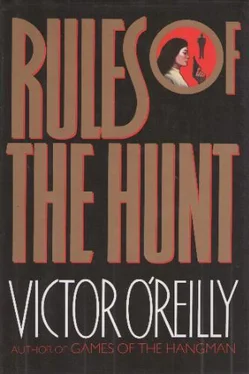Victor O'Reilly - Rules of The Hunt
Здесь есть возможность читать онлайн «Victor O'Reilly - Rules of The Hunt» весь текст электронной книги совершенно бесплатно (целиком полную версию без сокращений). В некоторых случаях можно слушать аудио, скачать через торрент в формате fb2 и присутствует краткое содержание. Жанр: Триллер, на английском языке. Описание произведения, (предисловие) а так же отзывы посетителей доступны на портале библиотеки ЛибКат.
- Название:Rules of The Hunt
- Автор:
- Жанр:
- Год:неизвестен
- ISBN:нет данных
- Рейтинг книги:4 / 5. Голосов: 1
-
Избранное:Добавить в избранное
- Отзывы:
-
Ваша оценка:
- 80
- 1
- 2
- 3
- 4
- 5
Rules of The Hunt: краткое содержание, описание и аннотация
Предлагаем к чтению аннотацию, описание, краткое содержание или предисловие (зависит от того, что написал сам автор книги «Rules of The Hunt»). Если вы не нашли необходимую информацию о книге — напишите в комментариях, мы постараемся отыскать её.
Rules of The Hunt — читать онлайн бесплатно полную книгу (весь текст) целиком
Ниже представлен текст книги, разбитый по страницам. Система сохранения места последней прочитанной страницы, позволяет с удобством читать онлайн бесплатно книгу «Rules of The Hunt», без необходимости каждый раз заново искать на чём Вы остановились. Поставьте закладку, и сможете в любой момент перейти на страницу, на которой закончили чтение.
Интервал:
Закладка:
"We found a nightclub receipt and a couple of cards in one of his suits. We went to the places concerned and had them identify Morinaga and the company he was with. Young Morinaga was out with some people from the Namaka Corporation."
"Eenie, meenie, miney, mo!" said Adachi.
"What does that mean?" said Inspector Fujiwara.
"Damned if I know," said Adachi. "Let's grab a few of the boys and go have a beer."
Chifune lay concealed behind a pile of packing cases on the third floor of a warehouse near the Fish Market at the back of the Ginza, and reflected upon the psychology of informers.
One of the packing cases held the pungent Vietnamese fermented fish sauce Nuoc Mam, and clearly a bottle or two had broken. The stuff stank. What the hell was wrong with good old-fashioned soy sauce? she wondered. The Japanese had the longest life span of any nationality, living proof that the traditional diet was superior.
Strictly speaking – if you wanted to evaluate the pure functionality of the issue – it was scarcely ever necessary to actually meet an informant. Information could be communicated by phone, by radio phone, by fax, or even posted – and that was without the more exotic methods of communication beloved of spies: dead-letter boxes, loose bricks, hollow trunks of trees, and the like. If you were computer literate, you could even use CompuServe, for heaven's sake.
No, the communication of information in itself did not require a meeting. It was the human element that dictated such an impractical, functionally unnecessary, and dangerous activity as a face-to-face encounter between informant and controller.
In accordance with Koancho operating procedure, Chifune had been trained not only by Koancho themselves, but also be a designated foreign intelligence agency. Traditionally, the foreign agency of choice had been the CIA, but Japan's ever-growing economic success had fostered a desire to exert some degree of independence, and in the late sixties, America's – and the CIA's – prestige being at somewhat of a low point thanks to the Vietnam War, Koancho had started trolling the field. There was plenty of precedent for Japanese traveling abroad to pick up foreign expertise. The initial impetus for the success of the Japanese economy had come from exactly this approach.
In the case of intelligence, Koancho hit pay dirt with Israel. Chifune's foreign training stint had been spent with Mossad, ‘the institute’ – in Hebrew, Ha Mossad, le Modiyn ve le Tafkidim Mayuhadim , the Institute for Intelligence and Special Operations.
She had undertaken the arduous course at Mossad's training center north of Tel Aviv that produces the elite of highly effective katsas – case officers – which are the backbone of Israeli intelligence. Chifune's grandmother was Jewish, a fact known to Mossad, which played no small part in the care they put into her training.
It was the Japanese side of her character that had Chifune waiting for a meeting with her informant. The Israelis had emphasized the inherent dangers and threats to security of such meetings, and had stressed that sheer logic dictated the importance of keeping such arrangements to a minimum. In contrast, her Japanese upbringing and even her Koancho training stressed the importance of ninjo, human feelings.
Ninjo were fundamental in all human relationships, even between police and yakuza or in the grubby world of case officer and informer. Even in the deadly business of counterterrorism, in Japan there was a need to respect one's giri, or obligations. For her part, Chifune felt a strong sense of obligation toward her informants. This was sensed and normally returned, and the resulting bond helped greatly toward her operational effectiveness.
The price she paid was that her life was not infrequently in danger. Her solution was her own personal version of ‘Walk softly and carry a big stick.’ She put a great deal of care into the preparations for every meeting and carried not a big stick, but her silenced Beretta.
Unless there was a foolproof cover story, Chifune varied the location of each meeting with an informant and tried to make each meeting place a plausible scenario.
In this case, her informant – code-named Iron Box – had a brother who was the accountant for the food importers who owned the warehouse and had his office in a partitioned-off area of the floor below. Accordingly, Iron Box had a solid reason for visiting the place, and right now, though the regular warehouse staff had gone home, her brother was working away downstairs on his abacus trying to reconcile stock. This was never an easy task where food was involved. The damn stuff was too portable and too easy to dispose of. The brother was convinced that packing cases of food had legs.
Iron Box was a code name randomly selected by the Koancho computer, and by design it was singularly inappropriate for the slight, demure, and rather pretty twenty-seven-year-old medical receptionist, one Yuko Doi, that Chifune was waiting to meet.
Miss Doi was also a terrorist, a member of a group known as The Cutting Edge of The Sword of the Right Hand of the Emperor – a name which did not roll easily off the lips, even in Japanese, and which was known as Yaibo – Japanese for ‘the cutting edge’ – for short. But Yaibo, despite their ridiculous name and rightist propaganda, was no laughing matter. It was the most effective Japanese terrorist group since the Red Army, and its specialty was assassination.
Yaibo also operated a five-person cell structure and was exceedingly difficult to penetrate. Iron Box was something of a coup. She was a by-product of Yaibo's habit of conducting regular purges, of killing its own people who were suspected of being informers.
Iron Box's lover had been just such a victim. He had been beaten to death over several days by her cell – including Iron Box herself – and the experience had dented her idealism. She had made a rather shaky call to the kidotai, the riot police who were in the front line of the battle against terrorism as far as the media were concerned, and then the connection had been quietly handed over to Koancho.
Slowly and carefully, Chifune shifted her location from the cover of the fish sauce to a pallet of bags of rice. Whatever the smell, the thought had occurred to her that if shit started to fly, the undoubtedly rice had better ballistic stopping properties than glass bottles of fish sauce. Better still, it was Japanese rice. Thanks to subsidies, it might be many times the world market price for rice, but every good Japanese knew it was superior.
The elevator started to creak and groan. The warehouse floor was rectangular in shape, with the elevator and stairs located side by side to one end. Directly facing the elevator door, but to one side, Chifune was concealed. Her position gave her quick access to either the fire escape or the stairs if she had to make a run for it. Locating the fastest way to get the hell out was one of the first lessons you learned in training. Heroics were not encouraged.
There was a rattle, a further series of groans, and a crash, and the doors of the goods elevator were open.
Chifune's gaze was fixed on the opening. She was expecting Iron Box, dressed in her normal smart suit, too-high heels and crisp blouse, but it could be the night watchman up to check the stock and decide what to steal that night. Chifune had noticed in her reconnaissances that with typical Japanese modesty he limited himself to one case per night.
The minimal warehouse lighting, presumably a gesture toward security, was provided by a series of low-power naked lightbulbs dangling above the intersections of pallets. The filthy ceiling of the room and the matte colors of the packing cases absorbed the light, and clear visibility was difficult.
Читать дальшеИнтервал:
Закладка:
Похожие книги на «Rules of The Hunt»
Представляем Вашему вниманию похожие книги на «Rules of The Hunt» списком для выбора. Мы отобрали схожую по названию и смыслу литературу в надежде предоставить читателям больше вариантов отыскать новые, интересные, ещё непрочитанные произведения.
Обсуждение, отзывы о книге «Rules of The Hunt» и просто собственные мнения читателей. Оставьте ваши комментарии, напишите, что Вы думаете о произведении, его смысле или главных героях. Укажите что конкретно понравилось, а что нет, и почему Вы так считаете.




![Беар Гриллс - The Hunt [=The Devil's Sanctuary]](/books/428447/bear-grills-the-hunt-the-devil-s-sanctuary-thumb.webp)







